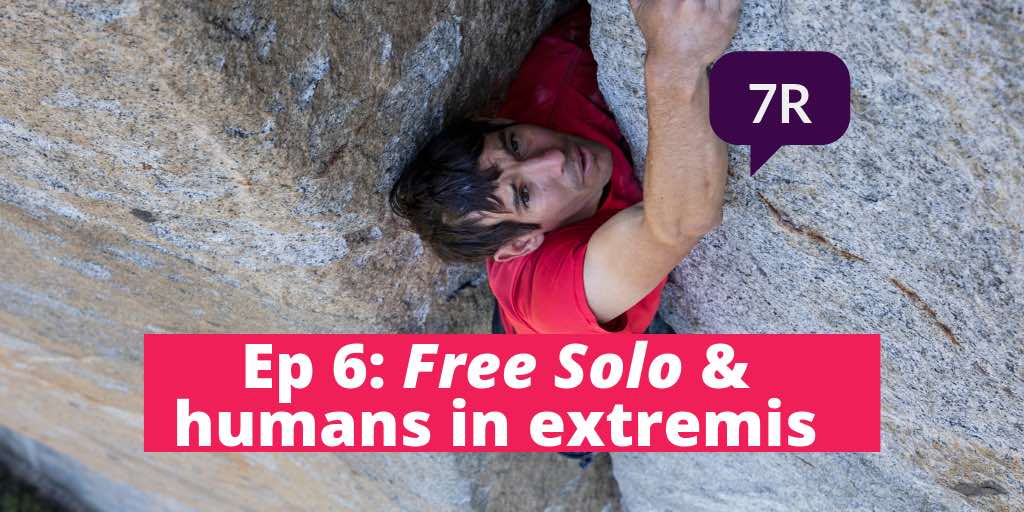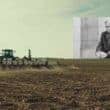Rock climber Alex Honnold discusses Free Solo, a new documentary about his ascent of Yosemite’s 3,000-foot El Capitan—without ropes.
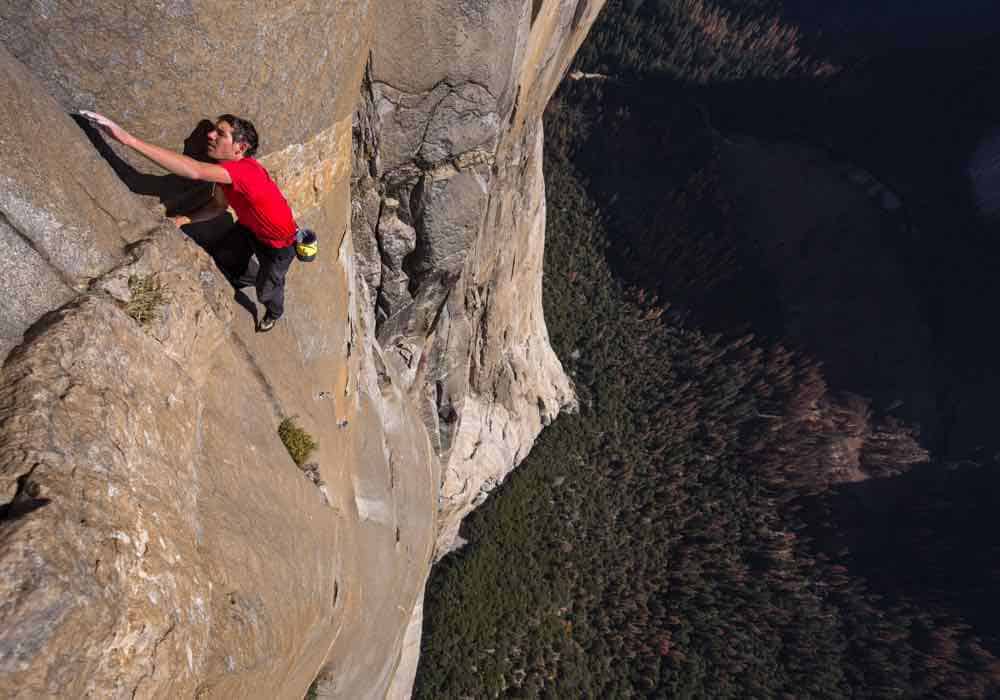
Discover one film you didn’t know you needed:
Not in the zeitgeist. Not pushed by streamers.
But still easy to find — and worth sitting with.
And a guide to help you do just that.
It’s a cloudless day in Yosemite National Park. A camera hovers thousands of feet above the tree line, scanning the lip of a massive cliff. The granite face below is vertical and exposed without holds or ledges. A bird’s song echoes in the distance; otherwise, the world at this altitude is still and quiet — until, inexplicably, a red t-shirt materializes. We hear Alex Honnold’s laboured breath.
On June 3rd, 2017, Alex Honnold scaled El Capitan, a 3,000-foot rock face, without a rope or safety gear — an accomplishment the New York Times dubbed “one of the greatest athletic feats of any kind, ever.” Free Solo, a new documentary, directs our attention to Alex’s process, chronicling his mental and physical preparation in advance of the Herculean climb.
The film’s co-directors Elizabeth Chai Vasarhelyi and Jimmy Chin were drawn to Alex as a subject before they knew of his plan to scale “El Cap.” As a result, the film’s concerns are often psychological: in one scene, Alex even submits to a brain scan. (It appears his amygdala, the brain’s fear center, is less excitable than most.) What emerges is a character study of a young man who pursues his goals, big and small, with both boyish zeal and laser-focus. His methods include eating vegetable mush for dinner and, until very recently, living out of a van.
It’s tempting to assume that Alex is blasé about death, but, in Free Solo, he comes across as a young man who cherishes life and respects its fragility. “When I’m doing these hard free solos, I like to think that the risk — the chance of me falling off — is quite low, even though the consequence is extremely high,” he says. Alex studies El Cap so religiously that he can picture every foothold, reach, and hand jam. In the end, he “only” needs to perform the dance he has rehearsed many times.
After spending nearly two hours with Alex over the course of Free Solo, I still had questions. I wanted to know how being filmed altered his climbing experience in the moment and how he thinks of that day in retrospect. As a kid, Alex began free soloing in order to avoid talking to people — so how does he feel about being the subject of a documentary?
When we chatted on the phone, Alex had just wrapped up a session in the climbing gym. Mid-interview, he ordered a shake.
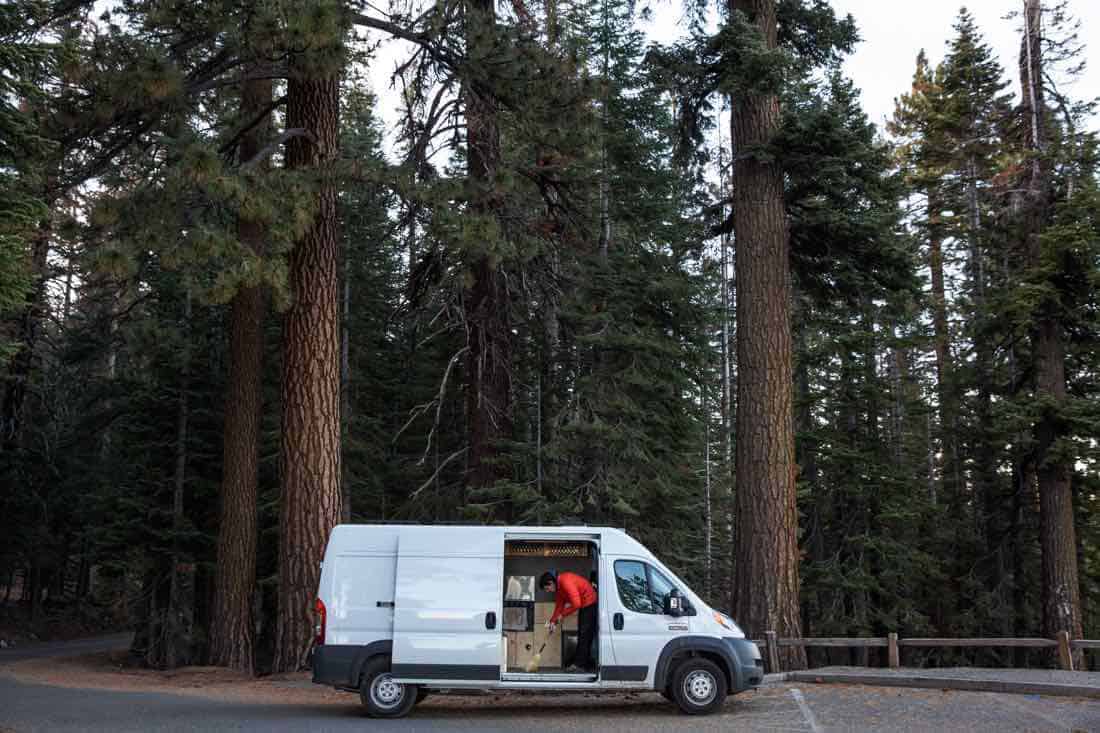
Seventh Row (7R): When you left UC Berkeley and began climbing full-time and living out of a van, what was your thought process? How did you think your life would take shape?
Alex Honnold (AH): Honestly, there wasn’t that much of a plan to it. I thought I was taking a semester off to go climbing, and then I…took the next semester off. Now it’s been, like, 25 semesters, maybe a few more. I just knew that I wanted to go climbing more than I wanted to do anything else.
[click_to_tweet tweet=”‘I just knew that I wanted to go climbing more than I wanted to do anything else.’ – Alex Honnold” quote=”‘I just knew that I wanted to go climbing more than I wanted to do anything else.’ – Alex Honnold”]
7R: As someone who was shy growing up, how do you feel about “the greatest day of your life” becoming the subject of public discussion?
AH: It’s a little bit weird, but at least it’s the best day of my life and not the worst day of my life. If it’s going to be under public scrutiny and observed by so many people, at least it’s something I’m proud of and something…I’m genuinely happy to share.
Listen to our podcast episode on Free Solo
7R: In the movie, you compare free soloing to warrior culture. Can you tell me about that analogy and how it occurred to you?
AH: First off, in the two years of filming, there are a lot of things that I say, [which now make me think,] “Oh wow, wonder where that came from?” [The film is] such an honest look at my life. Basically, if you captured [anybody] ranting for two years, you [would] get all kinds of interesting quotes.
That particular quote about warrior culture came from Morocco, where I went climbing with Tommy [Caldwell, a fellow elite rock climber, who helps Alex train]. When I was on that trip, I binge-watched four seasons of a show called Spartacus, which is [about] gladiator violence in Ancient Rome. It’s perfect mindless action television to get you fired up for hard climbing. It made me think of all my climbing like…being in the ring, rising to the occasion, and performing. I was in a total gladiator mode, which is honestly a good mindset for free soloing.
I definitely wouldn’t say that I think of myself as a warrior or anything like that, but I do think the quote is used fairly in the film. It’s just slightly embarrassing for me to hear now because it seems over the top.
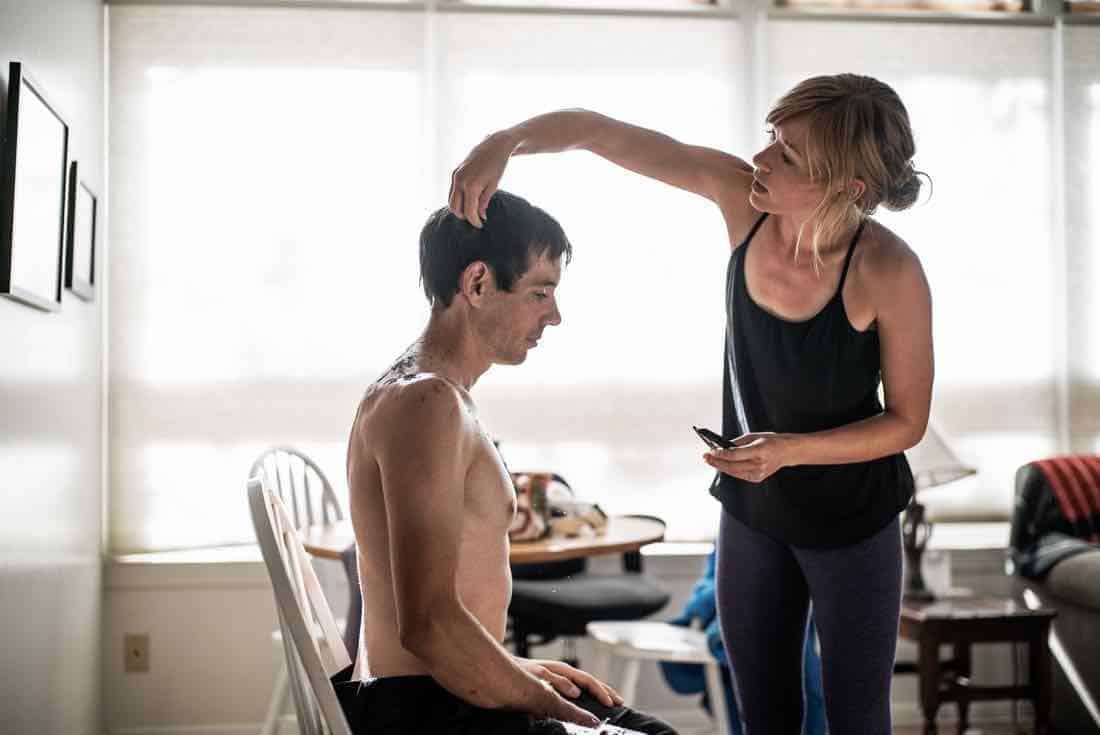
7R: What didn’t make it into the film from those two years? What was excluded?
AH: They shot over 700 hours, and it’s a 90 minute film, so there’s so much life that isn’t in there. My relationship with Sanni [McCandless, his girlfriend] is a key part of the film, but I don’t know if it really does justice to the two years [we spent] living together, being closer. More time happens than you can really express in a 90-minute film.
The only thing that I wish was in the film — but I totally understand why it can’t be — is the fact that, through the course of filming, I did five or six other free solos that had never been done before. The climber in me is pretty proud of those solos and wishes they were acknowledged in some way, but they all get swallowed into the climb of El Cap. At the time, everything was locked down because of filming, and now that those climbs are not in the film…it’s almost like they never happened.
[click_to_tweet tweet=”‘Now that those climbs are not in the film… it’s almost like they never happened.’ – Alex Honnold ” quote=”‘Now that those climbs are not in the film… it’s almost like they never happened.’ – Alex Honnold”]
7R: Do you think the film will replace your firsthand memories of that day?
AH: It’s a little too early to know because the experience is still fresh. The film has only been out for a month. I certainly think that will probably be true in 10 or 20 years because memories fade, whereas every time you see the film you’re like, “Oh, wow, that’s so amazing.” Pretty soon, that will be just what I remember.
7R: In your recent Ted Talk, you compare your free solo of Half Dome to climbing El Cap. While climbing Half Dome, you said you felt you got lucky, whereas, after years of preparation, you felt you achieved mastery over your route on El Cap. In Free Solo, we watch you gain mastery over more everyday things like eating vegetables and learning to hug. What are you trying to gain mastery of now?
AH: It’s more that, if you’re going to do something, you may as well do it well. Every day, I do interviews, or Q&As, or go to the climbing gym. [Since] that’s how I’m spending my time, I might as well try to do it the best that I can. That said, I’m not exactly trying to master the art of the Q&A. Ultimately, that’s not totally what I value in life, and I kind of don’t want to be too good at it. Climbing and free soloing are things that I care about in terms of true mastery, but not everything [belongs in that category].
7R: You’ve said you’re planning to spend more time working on the Honnold Foundation. The organization’s goals — to address global inequality and climate change — are ambitious, and the stakes are high. How does your approach for philanthropic work compare to your approach to climbing?
AH: [In both contexts,] I tend to take a big problem and break it into smaller parts. With climbing, I take a huge climb that seems like too much, but then I start. I train; I work towards it. I break [it] apart into pieces, work on the pieces, and then eventually do it. It’s definitely the same mindset…
Issues of global poverty or climate change…can seem totally insurmountable, but then when you start to break it into little pieces, you think, “Well, I can do a little bit on this piece.” You may as well start and try. They basically both stem from the idea that you may as well start doing something…though these are obviously very different activities.
[click_to_tweet tweet=”‘Issues of global poverty or climate change can seem totally insurmountable, but then when you start to break it into little pieces, you think, ”Well, I can do a little bit on this piece.” -Alex Honnold” quote=”‘Issues of global poverty or climate change can seem totally insurmountable, but then when you start to break it into little pieces, you think, ”Well, I can do a little bit on this piece.” -Alex Honnold”]
7R: The movie opens with a quote about free soloing making death feel more “present,” a feeling you seem to relish. Do you try to sustain a sense of your life’s fragility when you’re not 3,000 feet in the air?
AH: Actually, I would say that the feeling of free soloing is not relishing the feeling of mortality or death. It’s relishing the feeling of taking something that seems like it should be scary or dangerous and making it feel comfortable or safe. The real joy in soloing is to do something that should make you think you’re going to die, but then actually be totally comfortable and know that you’re not going to die. The pursuit of mastery, the work that you’re doing when soloing, is to make you feel comfortable.
[click_to_tweet tweet=”‘It’s relishing the feeling of taking something that seems like it should be scary or dangerous, and making it feel comfortable or safe.’ – Alex Honnold” quote=”‘It’s relishing the feeling of taking something that seems like it should be scary or dangerous, and making it feel comfortable or safe.’ – Alex Honnold”]
7R: In the film, the filmmakers openly question their decision to make the movie. Did you ever doubt whether or not you wanted the film to be made?
AH: When they were filming all the difficult conversations between me and Sanni, I certainly had moments where I was like, “Ahh, maybe I shouldn’t have signed up for this,” or, like, “What are we doing?” There were hard moments, but I never seriously thought about bailing or pulling out of the film. I had committed to this path and was going to see it through one way or another. Overall, I trusted the filmmakers to do what they needed to do to make a great film, in the same way that they were trusting me not to fall off the wall.
[click_to_tweet tweet=”‘I trusted the filmmakers to do what they needed to do to make a great film, in the same way that they were trusting me not to fall off the wall.’ – Alex Honnold” quote=”‘I trusted the filmmakers to do what they needed to do to make a great film, in the same way that they were trusting me not to fall off the wall.’ – Alex Honnold”]
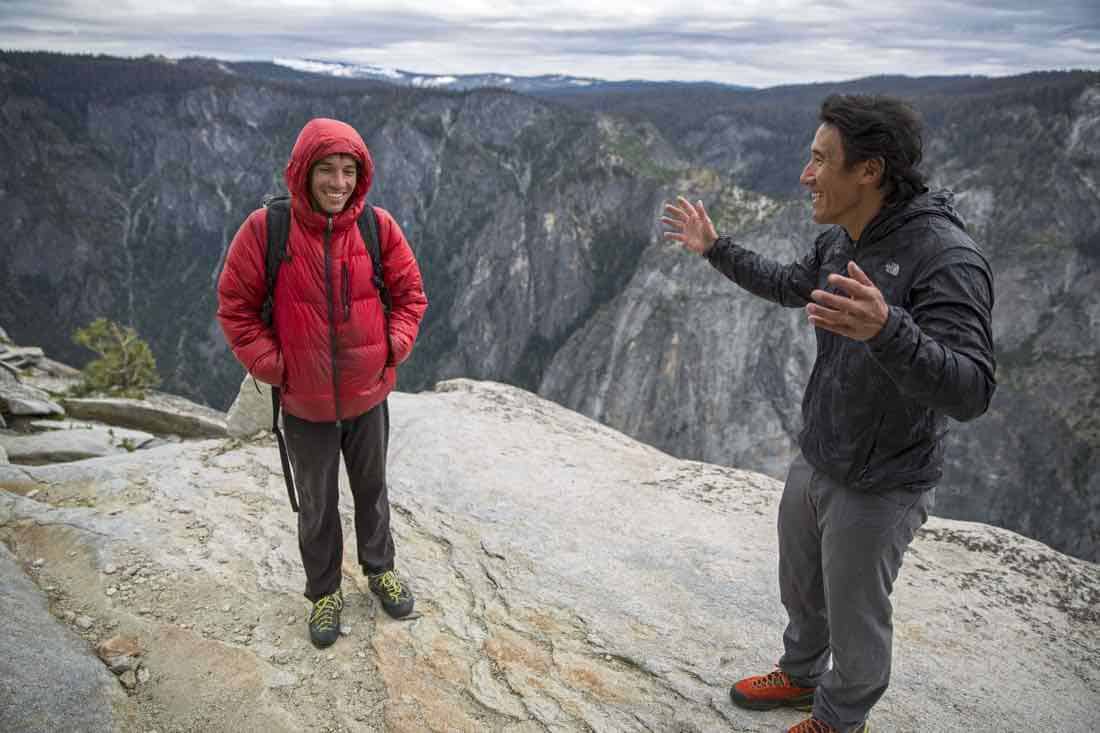
7R: Did the filmmaking process deepen your climbing experience?
AH: It’s funny. Everybody was stressed about making things worse for me, but ultimately, I think it probably made my experience better because I wound up putting in more preparation than I might have, if I had done it by myself. That made the actual climb feel better and safer.
And then on the day I climbed [El Capitan], you can see in the film that I’m celebrating with the crew and saying “hey” to my friends as I climb by. We had all worked so hard on the project, so it was nice to be with [my friends] on the summit.
[click_to_tweet tweet=”‘Everybody was stressed about making things worse for me, but ultimately, I think it probably made my experience better, because I wound up putting in more preparation.’ – Alex Honnold” quote=”‘Everybody was stressed about making things worse for me, but ultimately, I think it probably made my experience better, because I wound up putting in more preparation.’ – Alex Honnold”]
7R: Most people who watch Free Solo — like me — probably won’t go on to be big wall rock climbers. What do you hope we take away from the film?
AH: Honestly, I went into the film with no particular agenda. My goal was always to free solo El Cap. I wanted to do the climb, and I wanted the film to do justice to El Cap, to show the inspiration, and to show the grandeur I see in the wall. I had no editorial control over the film, so I saw what Chai and Jimmy created and was like, “Oh wow, nice work,” but it wasn’t exactly my plan.
It has been really nice seeing the reception, seeing that audiences seem to be inspired in their own ways. It seems like most people tend to take whatever they need from the film. So many people chat with me after the screenings in different cities, and they all cherry-pick different lessons from it. I think that’s great. People just take whatever they need.
7R: What about audiences’ reactions has surprised you most?
AH: Maybe the thing that most surprises me is that there are a lot of lines in the film where I’m talking to Sanni, and I seem particularly unkind. When I watch it, I cringe. I’m like, “Oh, that’s kind of hard to watch,” and “Bad boyfriend. That’s pretty harsh.” But I’ve had a number of people tell me that they really enjoyed that stuff in the film because they felt it was so honest. They’re like, “We’ve all had those conversations,” and “That stuff just happens in life.” I see it as “Oh, I’m terrible,” but it seems like most people have been pretty forgiving…which has made me feel slightly better.
7R: I read the New Yorker piece about your climb New Jersey. Are you excited to try urban climbing in a serious capacity? Or was that a one-time, just-for-fun thing?
AH: I’ve had the opportunity to climb on a few skyscrapers. Whenever I’m allowed to, it seems like something worth doing. It’s really rare to get permission, and it’s kind of a unique experience. When you get to, you may as well.
